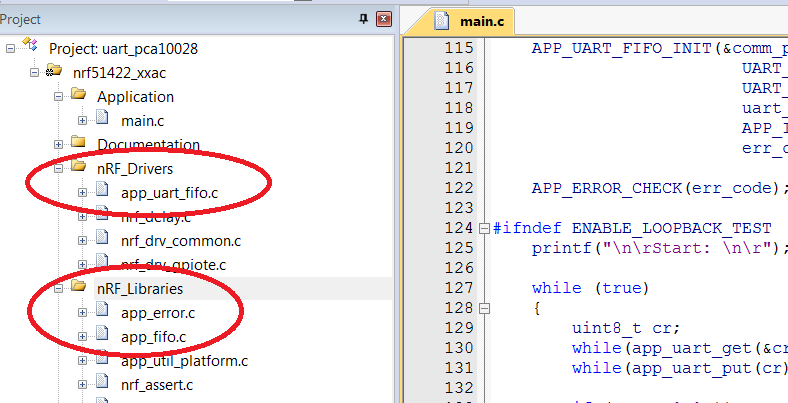Hi,
I have PCA10028 board, and I'm trying to implement UART send/receive. I've searched for the problem here but could not find a solution for it.
My uart init function is(most of the code is copy/paste):
static void uart_init(void)
{
uint32_t err_code;
app_uart_comm_params_t params;
memset(¶ms, 0, sizeof(params));
params.baud_rate = UART_BAUDRATE_BAUDRATE_Baud115200;
params.tx_pin_no = TX_PIN_NUMBER;
params.rx_pin_no = RX_PIN_NUMBER;
params.use_parity = false;
params.flow_control = APP_UART_FLOW_CONTROL_DISABLED;
static uint8_t rx_buffer[UART_RX_BUFFER_SIZE];
static uint8_t tx_buffer[UART_TX_BUFFER_SIZE];
app_uart_buffers_t buffers;
buffers.rx_buf = rx_buffer;
buffers.rx_buf_size = UART_RX_BUFFER_SIZE;
buffers.tx_buf = tx_buffer;
buffers.tx_buf_size = UART_TX_BUFFER_SIZE;
err_code = app_uart_init(¶ms, &buffers, uart_event_handle, APP_IRQ_PRIORITY_LOW, NULL);
APP_ERROR_CHECK(err_code);
}
This is event handler:
void uart_event_handle(app_uart_evt_t * p_event)
{
static uint8_t data_array[BLE_MAX_DATA_LEN];
static uint8_t index = 0;
uint32_t err_code;
switch (p_event->evt_type)
{
case APP_UART_DATA_READY:
UNUSED_VARIABLE(app_uart_get(&data_array[index]));
index++;
if ((data_array[index - 1] == '\n') || (index >= (BLE_MAX_DATA_LEN)))
{
// TODO: Check sending of data here
//err_code = ble_nus_string_send(&m_nus, data_array, index);
if (err_code != NRF_ERROR_INVALID_STATE)
{
APP_ERROR_CHECK(err_code);
}
index = 0;
}
break;
case APP_UART_COMMUNICATION_ERROR:
APP_ERROR_HANDLER(p_event->data.error_communication);
break;
case APP_UART_FIFO_ERROR:
APP_ERROR_HANDLER(p_event->data.error_code);
break;
default:
break;
}
}
And this is my write function:
void app_uart_put_string(const char* s)
{
uint8_t len = strlen(s);
for (uint8_t i = 0; i < len; i++)
{
while (app_uart_put(s[i]) != NRF_SUCCESS);
//err_code = app_uart_put(s[i]);
//APP_ERROR_CHECK(err_code);
}
}
When this is used: err_code = app_uart_put(s[i]); APP_ERROR_CHECK(err_code); and while (app_uart_put(s[i]) != NRF_SUCCESS) is omitted, this function sends continuously bytes which are not in the char* s. If I send 1 byte it sends it normally and I can see it on the terminal, but when I try to send 2 bytes it sends gibberish continuously.
So I've searched for solution and found: while (app_uart_put(s[i]) != NRF_SUCCESS).
Unfortunately, I've used it and now my PCA board is stuck. I can't flash the new code, can't debug, can't erase with nrfjprog --eraseall and can't erase it in nRFgo Studio. It's not recognized at all.
1.) How can I "unstuck" my board? 2.) Is there an implementation of UART which works? I need a simple sending and receiving of bytes over UART, at higer speeds (baud 115200 or above). I've also found fifo implementation but can't get it to send or receive. I use S110.
Thank you!
Regards, Mladen



